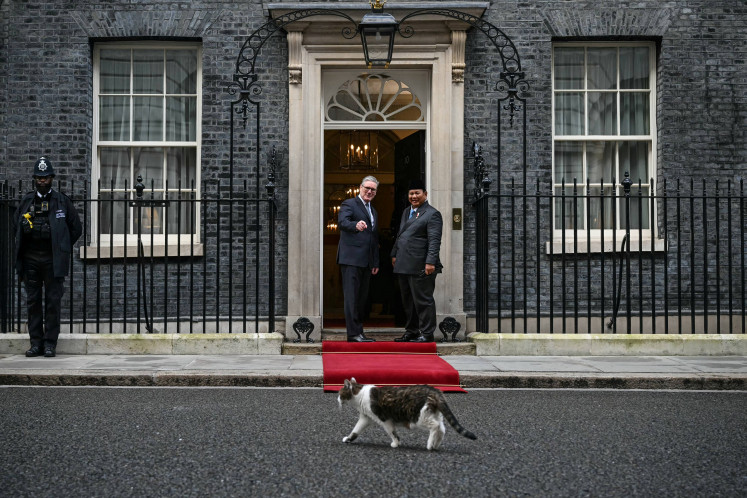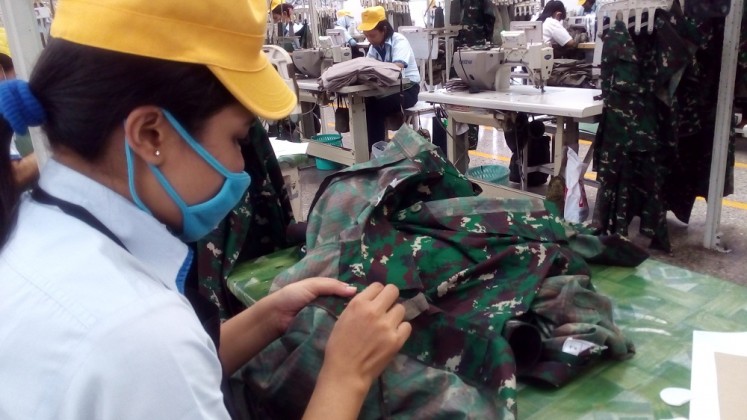Popular Reads
Top Results
Can't find what you're looking for?
View all search resultsPopular Reads
Top Results
Can't find what you're looking for?
View all search resultsDrug empire continues behind bars
Joe, not his real name, has spent the last two years in Central Jakarta’s Salemba Penitentiary on marijuana possession charges
Change text size
Gift Premium Articles
to Anyone
J
oe, not his real name, has spent the last two years in Central Jakarta’s Salemba Penitentiary on marijuana possession charges.
However, despite his incarceration, he said he stilled enjoy smoking marijuana or consuming crystal methamphetamine, locally known as shabu.
“I barely see any rules, let alone the law, applied inside this prison. Anyone can enjoy marijuana or shabu,” he told The Jakarta Post last week.
For instance, he said prison guards would alert them whenever an inspection was expected. Joe added he profited from the sale of illegal drugs, by helping to bring crystal meth and marijuana into the prison.
“Several times a week, I’m usually told to wait near the prison church. After that, I deliver the package
to several other dealers who distribute it throughout the prison,” he said, adding that shabu was sold at Rp 1.5 million (US$ 158) to Rp 2 million per gram.
Joe refused to disclose his exact income and profit, but said he made enough to satisfy others in the business — including fellow dealers distributing reportedly some 15 grams a day in Salemba alone.
“I usually keep Rp 1 million each week, while the rest I give to my friends here, because they are my last resort whenever I run into trouble,” he said, boasting that he had 30 to 50 friends ready to defend him in times of need.
“You have to watch your back — that’s what I’ve learned in life,” he said.
After safeguarding the delivery of the drugs, Joe said he then proceeds to collect debts from the users in the prison.
“I go to their cell one by one. If they fail to pay their debts, I take their personal assets like televisions, laptops or even refrigerators instead,” he said.
When asked who controlled broader distribution, Joe only said that there were two major players in town. These drug dealers, who pay the wardens, usually received the crystal meth from an Iranian drug syndicate, he said.
“The crystal meth from the Iranian syndicate is better than the others,” he said.
The director of public order at the Penitentiary Directorate, Gen. Ma’mun, said he could not deny that many of his staff and wardens across 563 prisons in the country had received bribes from inmates.
“We are facing classic issues here — limited human resources compared with the huge numbers of inmates with various backgrounds and intentions. Thus there are many loopholes [...] including receiving bribes from the inmates.” he said.
Presently 31,000 prison staff serve at the 563 prisons. Many or them, primarily those found in large cities, are overcrowded, operating at up to 300 percent their normal capacity.
However, Ma’mun stressed that his office had set up an internal task force to conduct random inspections throughout Indonesia’s prisons.
“As a result, we have uncovered 69 cases this year alone, which we have handed over to the police for further investigation,” he said. However, he said that only eight officers have been punished for their offenses, adding that his office was seeking new, more effective strategies for conducting inspections.
Regarding the distribution of drugs and narcotics within the prison system, National Narcotics Agency (BNN) operational director Brig. Gen. Benny Mamoto said that awareness of this “rampant” problem was the reason behind several inspections this year.
Led by Deputy Law and Human Rights Minister Denny Indrayana, a joint task force made up of BNN and ministry officials has been pursuing inmates BNN has identified as drug dealers inside prisons.
However, the task force’s last surprise inspection, held at Bali’s Kerobokan Prison in February, descended into chaos as inmates protested the early-morning inspection. Ma’mun blamed the situation on a lack of coordination, while others suspect top-level involvement in the drug empire.
The brawl that ensued led to a temporary halt of the task force’s inspection activities.
Benny Mamoto, however, said that the task force relied on the element of surprise, and could therefore not risk telling wardens about their plans.
“We have already determined our target [in conducting inspections]. Thus we aren’t there to inspect every inmate one by one, but we already have solid information about specific drug dealers inside the prison,” he said, adding that more inspections were in the pipeline.
As long as authorities share in the profits, inspections will clearly remain a small measure in combating drug abuse throughout the country.










